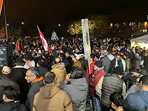Pakistan general elections 2024 on February 8: Candidates, voting process | Explained
Pakistan is set to vote on Thursday, February 8, in the widely anticipated general elections, which will lead to the formation of a new government relieving the crises-ridden country for the next five years.

Being a parliamentary democracy, Pakistan is set to vote in the federal legislature or the House Assembly and four state legislatures. A total of 44 political parties comprising 5,121 candidates are contesting in the federal legislature, whereas 12,695 candidates in state legislatures.
Discover the thrill of cricket like never before, exclusively on HT. Explore now!A total of 128 million out of the 241 million population are above 18 and are eligible to vote.
Major events in the past year that led to the elections:
On August 9, 2023, Pakistan's president dissolved the National Assembly, marking the initial phase of preparations for the upcoming general election.
On October 21, 2023, former Pakistan PM Nawaz Sharif returned to the country after spending four years in self-imposed exile abroad to evade imprisonment on corruption charges. Upon his return, his convictions and sentences are overturned upon appeal.
The election oversight body of Pakistan postponed parliamentary elections on November 2, 2023, for the second time. Originally planned for November and later rescheduled for the last week of January, the elections are now set to take place on February 8.
How does it work?
While the results of the election would begin coming around Thursday evening, official results would be announced on Friday.
The National Assembly has 336 seats, out of which 266 candidates are elected through direct voting and 70 seats are reserved. Of these reserved seats, 60 are for women and 10 for non-Muslims and they are allocated as per each party's strength in the Assembly.
While the winning candidates become a part of the National Assembly, independent candidates have the choice of joining any party post-voting.
Once the National Assembly members are elected, they hold a vote to select the leader of the House or Prime Minister.
A PM candidate needs to show a majority in the house, which means they would require the support of 169 members.
A similar procedure is implemented at the provincial level to select a chief minister and form a provincial government.
If no party gains a majority, then the party with the biggest share forms a coalition.
Who is running in the race?
Three major parties dominate Pakistan's politics — Pakistan Muslim League-Nawaz (PML-N), the Pakistan People's Party (PPP) and the Pakistan Tehreek-e-Insaf (PTI).
PML-N is emerging as the top contender in the race with two former prime ministers — Nawaz Sharif and his younger brother Shehbaz Sharif — leading the party.
PPP, an ally of PML-N, is led by Bilawal Bhutto-Zardari and has a strong base in south Pakistan. As per AP, Bilawal lacks the popularity to garner enough votes to become a PM, however, he can be a part of the coalition government led by Sharif.
PTI's founder Imran Khan is absent from the political ballot this term due to four criminal convictions, out of which three were issued last week rendering him ineligible to participate in elections or assume public office. He has received sentences of three, 10, 14, and seven years, to be served concurrently, and faces over 150 additional legal cases. His party alleges unfair treatment, claiming they are not afforded a fair opportunity to campaign.
While Pakistan's military is not officially running for the elections, it holds significant influence behind the scenes. It is widely known that the country's army has ruled it for a significant part of its democratic history and has dictated the government's decisions on multiple occasions.
Major issues in Pakistan
The upcoming government will have its hands full with several issues including the country's grappling economy, improving relations with neighbouring Afghanistan, repairing Pakistan's infrastructure, resolving the issue of power outages and containing the growing separatist militant groups.
What is likely to be the outcome of the February 8 elections?
As reported by AP, most Pakistani nationals are disillusioned after enduring years of political discord and witnessing no improvement in their living standards. They express scepticism about any potential change following the upcoming election.
The return of former Prime Minister Nawaz Sharif last year, his swift exoneration upon return, enabling him to pursue a fourth term in office, contrasts starkly with the legal challenges faced by his rival, Imran Khan. Sharif retains significant popularity and many anticipate his victory.
The foreign ministry has announced the presence of 92 international election observers, including representatives from the European Union and various foreign embassies. Rights groups have also cautioned against expecting a fair and transparent election.
Khan's removal in 2022 has fueled anti-establishment sentiments, which is likely to result in low voter turnout, further undermining the election's credibility.
(With inputs from agencies)
Disclaimer: The copyright of this article belongs to the original author. Reposting this article is solely for the purpose of information dissemination and does not constitute any investment advice. If there is any infringement, please contact us immediately. We will make corrections or deletions as necessary. Thank you.
Title:Pakistan general elections 2024 on February 8: Candidates, voting process | Explained
Url:https://www.investsfocus.com









